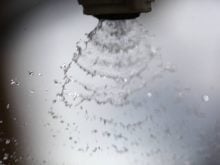What do Mount Everest and honeybees have in common? Check out May 29.
That was the day in 1953 when Sir Edmund Hillary and Sherpa Tenzing Norgay became the first people to successfully climb the world’s highest mountain. Hillary was a beekeeper from New Zealand.
This year, May 29 was the day proclaimed by Ottawa, Manitoba and other provinces as The Day of the Honeybee, using the Hillary connection to do so.
“Honeybees not only produce delicious honey which is recognized for its nutritional value, but they also play a vital role in pollinating plants that produce as much as one-third of the food that we eat,” said Manitoba Agriculture, Food and Rural Initiatives Minister Stan Struthers in his proclamation.
Read Also

Mazergroup’s Bob Mazer dies
Mazergroup’s Bob Mazer, who helped grow his family’s company into a string of farm equipment dealerships and the main dealer for New Holland machinery in Saskatchewan and Manitoba, died July 6 from cancer.
The Manitoba Beekeepers Association and the Red River
“Insects are an important part of the environment and not all insects are harmful.”
– charles polcyn
Apiarists’ Association hosted an all-day booth at The Forks Market in Winnipeg to inform the urban public about the importance of bees. And, of course, to sell a little honey.
The new event is in addition to the beekeepers’ annual honey show, usually held in fall.
City people need to know more about bees in particular and insects in general, said Charles Polcyn, the apiarists’ association president.
“In some ways, the urban gardener is a little bit more destructive to insects than the farmer is because the farm is a bit more cautious about using pesticides correctly, where the urban gardener just seems to spray stuff willy-nilly,” said Polcyn.
“They don’t seem to understand the science that insects are an important part of the environment and not all insects are harmful.”
Pesticides are one of the reasons cited for a recent decline in honeybee populations worldwide. Varroa mites and various diseases are also blamed.
Scientists generally believe there’s no single reason for widespread losses of bee colonies over the last three years and that a combination of factors are responsible.
Polcyn said bees are more important than most people realize, even in cities. A lot of backyard gardeners grow vegetables, such as tomatoes and cucumbers, which require pollination by insects. So do apple trees.
Some cities, such as Vancouver and, most recently, New York, permit beekeeping inside city limits. Polcyn said his association wants Winnipeg to change a 1983 bylaw which bans exotic species within the city, inexplicably including honeybees.
He acknowledged it’s an uphill battle.
“It’s political, is what it is,” was all Polcyn would say. “It depends upon the mayor.”
Nevertheless, there are still honeybee colonies in and around Winnipeg, including some at the University of Manitoba and the Fort Whyte Alive nature centre. A few small beekeepers operate below the radar inside the Perimeter Highway, Polcyn admitted.
Polcyn asked homeowners to grow more nectar-rich flowers to attract bees roaming within the city.
He offered this advice when asked what he expected from people concerned about declining bee populations.
“To be more insect friendly, to be more honeybee friendly and not to spray everything you see on your roses.”
Provincial apiculturist Rheal Lafreniere called The Day of the Honeybee an opportunity for the industry to raise public awareness of the role bees play in food production.
“It gives the beekeeping community a platform to not only celebrate the honeybee but to take it to the public,” Lafreniere said. [email protected]


















